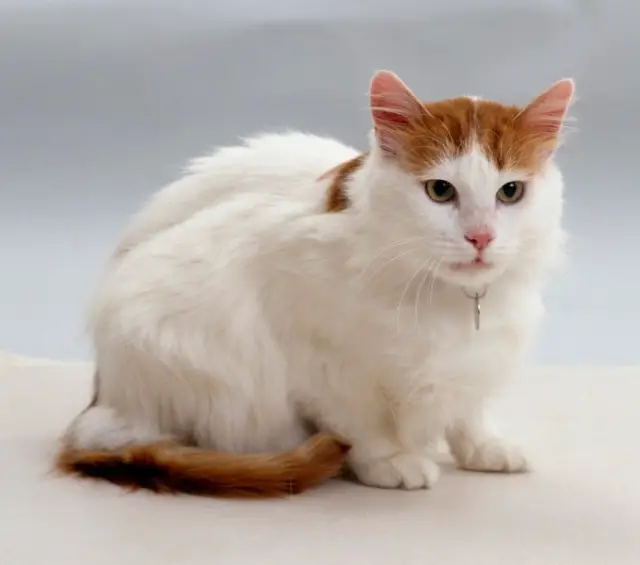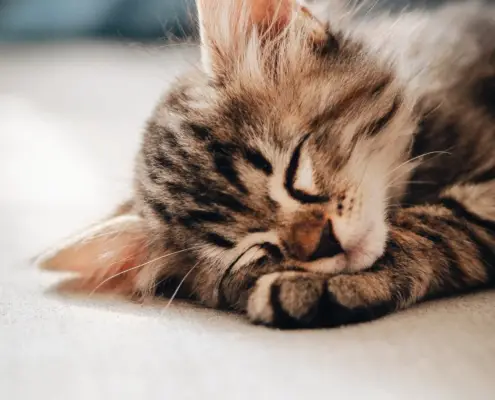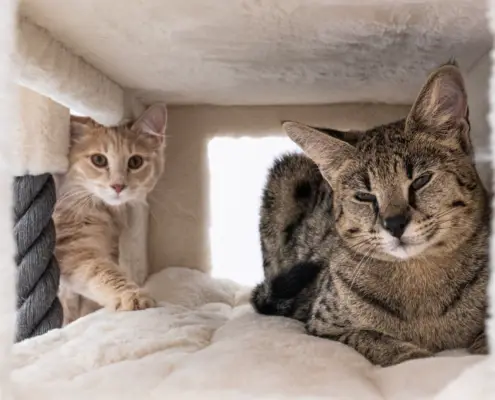Breed Name
Turkish Van
Alternate Names
Turkish Cat, Swimming Cat

The Turkish Van cat breed is a truly unique and fascinating feline that has captured the hearts of cat lovers around the world. With their distinct physical characteristics and playful nature, Turkish Van cats have become increasingly popular as pets in recent years. In this guide, we will delve into the history, physical characteristics, personality traits, care and grooming, health concerns, training and socialization, as well as adoption options for Turkish Van cats. Whether you are a seasoned cat owner or considering adding a new furry friend to your family, this article will provide you with everything you need to know about the Turkish Van cat breed.
History and Origin of the Turkish Van Cat Breed
The Turkish Van cat breed was developed from 1955 in the UK by Laura Lushington from a selection of cats obtained from various cities of modern Turkey, especially southeast Turkey. Recognised by the GCCF in 1969 under the name “Turkish Cat,” it was renamed to “Turkish Van” in 1979 to distinguish it from the Turkish Angora breed.
The Turkish Van cats are not the same as Van (Van Kedisi in Turkish) cats, which is not a recognised standard breed, but a natural breed that occupies the area around Lake Van in the Eastern Anatolia Region of Turkey. According to a lecture by Leslie Lyons, “The Turkish Van is genetically similar to the four cats submitted as Van Kedisi.” This may suggest that while the Van Kedisi does not conform to the Turkish Van breed standard, they may be very closely related.
Physical Characteristics of Turkish Van Cats
Turkish Van cats are instantly recognizable for their stunning coat pattern, which is predominantly white with splashes of color on their heads and tails. This unique pattern is known as “van pattern” and is characterized by a solid-colored tail and colored markings solely on the head. The most common colors found in Turkish Van cats are red, black, or a combination of both. Their eyes are large and expressive, usually amber or blue in color. In terms of size, Turkish Van cats are considered to be medium to large, with muscular bodies and strong legs. They have a long, elegant neck and a wedge-shaped head that is slightly rounded. Overall, the physical appearance of Turkish Van cats is truly captivating and adds to their allure as a breed.
Personality Traits of Turkish Van Cats
Aside from their striking appearance, Turkish Van cats are known for their friendly and outgoing personalities. They are highly social animals that thrive on human companionship and make great family pets. Turkish Van cats are often described as being intelligent, curious, and playful. They have a natural sense of adventure and enjoy exploring their surroundings. Despite their active nature, Turkish Van cats are also known for their gentle and affectionate demeanor. They form strong bonds with their owners and are often found following them around the house or curling up in their laps for a nap. Turkish Van cats are also known to be good with children and other pets, making them a great addition to any household.
Turkish Van Cat Care and Grooming
Taking care of a Turkish Van cat involves providing them with a balanced diet, regular veterinary check-ups, and plenty of exercise and mental stimulation. Due to their semi-longhaired coat, Turkish Van cats require regular grooming to keep their fur free from tangles and matting. It is recommended to brush them at least once a week to prevent the build-up of loose hair and to keep their coat looking its best. Turkish Van cats are generally healthy cats, but it is important to monitor their weight and ensure they receive the appropriate vaccinations and preventative treatments for common feline diseases. Regular dental care is also essential to maintain their oral health.
Health Issues and Concerns in Turkish Van Cats
While Turkish Van cats are generally a healthy breed, like any other cat, they are susceptible to certain health issues. One common health concern in Turkish Van cats is hypertrophic cardiomyopathy (HCM), which is a condition that affects the heart muscle. Regular cardiac screenings by a veterinarian are recommended to detect any signs of HCM early on. Turkish Van cats are also prone to developing urinary tract issues, such as urinary stones or infections. Providing a high-quality diet and ensuring they have access to plenty of fresh water can help prevent these problems. It is important to be aware of the potential health risks in Turkish Van cats and to seek veterinary care if any symptoms or concerns arise.
Training and Socialization for Turkish Van Cats
Turkish Van cats are highly intelligent and can be easily trained using positive reinforcement techniques. They are quick learners and enjoy engaging in interactive play sessions with their owners. Training should focus on teaching them basic commands, such as sit, stay, and come, as well as providing them with mental stimulation through puzzle toys and treat-dispensing games. Socialization is also an important aspect of raising a Turkish Van cat. Exposing them to different people, animals, and environments from a young age will help them develop into well-rounded and confident cats. It is recommended to start socialization and training as early as possible to ensure a happy and well-adjusted Turkish Van cat.
Turkish Van Cat Breeders and Adoption Options
If you are considering adding a Turkish Van cat to your family, there are several options to choose from. One option is to find a reputable Turkish Van cat breeder who specializes in this particular breed. It is important to do thorough research and visit the breeder’s facilities to ensure they prioritize the health and well-being of their cats. Another option is to adopt a Turkish Van cat from a rescue organization or shelter. Many cats of this breed are in need of loving homes and adopting a rescue cat can be a rewarding experience. Whichever option you choose, make sure to ask questions, gather information, and make an informed decision to ensure a positive experience for both you and your new furry friend.
Why Turkish Van Cats Make Great Pets
Turkish Van cats are a rare and exquisite breed that offers a unique combination of beauty, intelligence, and affection. Their stunning coat pattern, playful personalities, and social nature make them a wonderful addition to any family. Whether you are looking for a companion to curl up with on the couch or an adventurous playmate, a Turkish Van cat can fulfill both roles with ease. However, it is important to remember that owning a cat is a long-term commitment that requires love, care, and attention. By providing your Turkish Van cat with a nurturing environment and meeting their physical and emotional needs, you will be rewarded with a loyal and loving companion for many years to come.
If you enjoyed my article, I would appreciate you sharing it with your network.

Sima Ndlebe
Sima writes for CatBuzz. He is interested in Cats, Health and Fitness, and Entrepreneurship.
Published: 13 October 2023




